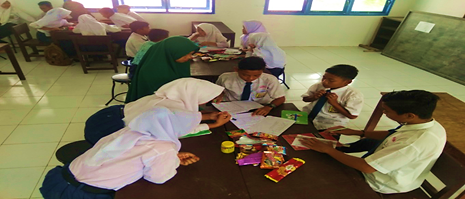Gambaran Pelaksanaan Kegiatan Pembelajaran untuk Meningkatkan Kemampuan Literasi Matematika Siswa Overview of Implementation of Learning Activities to Improve Students' Math Literacy Ability
Main Article Content
Abstract
One indicator that can be used as a success in the educational process is the value of students' mathematical literacy abilities. In Satu Atap Aek Natas Junior Secondary School out of 122 samples, the results of 87 students are still relatively low. Mathematical literacy is influenced by, among others, the interest in reading mathematics and low family social support. For this reason, the solution offered in the implementation of community service is to carry out learning activities using a recitation-assisted PMR approach, the application of the principle of economic tokens accompanied by the use of a contact book. Participants in the implementation of this service consisted of 30 students, 30 parents/guardians of students, and 15 teachers. Based on the results of the implementation of community service there is an increase in the average value of literacy skills, interest in reading and social support of the family before the implementation and after the implementation of service.
Downloads
Article Details
Authors who publish with this journal agree to the following terms:
- Any article on the copyright is retained by the author(s).
- Author grant the journal, right of first publication with the work simultaneously licensed under a Creative Commons Attribution License that allows others to share work with acknowledgment of the work authors and initial publications in this journal.
- Authors are able to enter into a separate, additional contractual arrangements for non-exclusive distribution of published articles of work (eg, post-institutional repository) or publish it in a book, with acknowledgment of its initial publication in this journal.
- Authors are permitted and encouraged to post their work online (e.g., in institutional repositories or on their websites) prior to and during the submission process, as can lead to productive exchanges, as well as earlier and greater citation of published work.
- The article and any associated published material is distributed under the Creative Commons Attribution-ShareAlike 4.0 International License
References
Cahyani, I.R. 2016. Peran orang tua dan guru dalam mengembangkan literasi dini (early literacy) di kabupaten sidoarjo. Skripsi. Surabaya: Universitas Airlangga.
Fathani, A.H. 2016. Pengembangan Literasi Matematika Sekolah Dalam Perspektif Multiple Intelligences. Edu Sains: Jurnal Pendidikan Sains dan Matematika. 4(2):136-150. https://doi.org/10.23971/eds.v4i2.524
Kaisar, M.I. 2017. Pengaruh Persepsi Minat Baca Matematika Terhadap Kemampuan Literasi Matematika Pada Materi Fungsi Komposisi dan Fungsi Invers Pada Siswa Kelas XI di Makassar. Skripsi. Makssar: Universitas Negeri Makassar.
Kharizmi, M. 2015. Kesulitan Siswa Sekolah Dasar Dalam Meningkatkan Kemampuan Literasi. JUPENDAS (Jurnal Pendidikan Dasar). 2(2):11-21.
Khoirudin, A., Styawati, R.D., Nursyahida, F. 2017. Profil Kemampuan Literasi Matematika Siswa Berkemampuan Matematis Rendah Dalam Menyelesaikan Soal Berbentuk PISA. AKSIOMA: Jurnal Matematika dan Pendidikan Matematika. 8(2):33-42. http://dx.doi.org/10.26877/aks.v8i2.1839
Larasaty, B.M., Mustiani, M., Pratini, H.S. 2018. Peningkatan Kemampuan Literasi Matematika Siswa Kelas VIII SMP BOPKRI 3 Yogyakarta Melalui Pendekatan Pmri Berbasis PISA Pada Materi Pokok SPLDV. In Prosiding Seminar Nasional Pendidikan Matematika Etnomatnesia. Yogyakarta: Universitas Sarjanawiyata Tamansiswa.
Lastuti, F.A.O., Maharani, R.M., Pratini, H.S. 2018. Analisis Kemampuan Literasi Matematika Kelas VIII Menurut Gender. In Prosiding Seminar Nasional Pendidikan Matematika Etnomatnesia. Yogyakarta: Universitas Sarjanawiyata Tamansiswa.
Madyaratria, D.Y., Wardono, W., Prasetyo, A.P.B. 2019. Kemampuan Literasi Matematika Siswa pada Pembelajaran Problem Based Learning dengan Tinjauan Gaya Belajar. PRISMA, Prosiding Seminar Nasional Matematika. 2:648-658.
Mahdiansyah, Rahmawati. 2014. Literasi Matematika Siswa Pendidikan Menengah: Analisis Menggunakan Desain Tes Internasional dengan Konteks Indonesia. Jurnal Pendidikan dan Kebudayaan. 20(4):452-469. http://dx.doi.org/10.24832/jpnk.v20i4.158
Masjaya, Wardono. 2018. Pentingnya Kemampuan Literasi Matematika untuk Menumbuhkan Kemampuan Koneksi Matematika dalam Meningkatkan SDM. PRISMA, Prosiding Seminar Nasional Matematika. 1:568-574.
Muti’ah, R. 2017. Hubungan Antara Minat Belajar, Fasilitas Belajar Dan Keterlibatan Orang Tua Dengan Prestasi Belajar. Jurnal Pembelajaran dan Matematika Sigma (JPMS). 3(1):48-58. https://doi.org/10.36987/jpms.v3i1.1281
Novrinda, N., Kurniah, N., Yulidesni, Y. 2017. Peran Orangtua Dalam Pendidikan Anak Usia Dini Ditinjau Dari Latar Belakang Pendidikan. Jurnal Ilmiah Potensia. 2(1):39-46. https://doi.org/10.33369/jip.2.1.39-46
Praditha, I.M.A., Kusmariyatni, N., Japa, I.G.N. 2017. Hubungan Antara Kemampuan Membaca Pemahaman Dengan Menyelesaikan Soal Cerita Matematika Siswa Kelas IV. Mimbar PGSD Undiksha. 5(2):1-10. http://dx.doi.org/10.23887/jjpgsd.v5i2.10987
Rahmani, M.A.C., Haryono, H., Purwanti, E. 2017. Pengembangan Media Komunikasi Buku Penghubung Berbasis SMS Gateway dan Mobile Web. Innovative Journal of Curriculum and Educational Technology. 6(2):15-21.
Siswowijoyo, M., Tiya, K. 2014. Deskripsi Kemampuan Literasi Matematika Siswa Kelas IX SMP Negeri Di Kota Raha. Jurnal Penelitian Pendidikan Matematika. 2(2):73-90. http://dx.doi.org/10.36709/jppm.v2i2.3095
